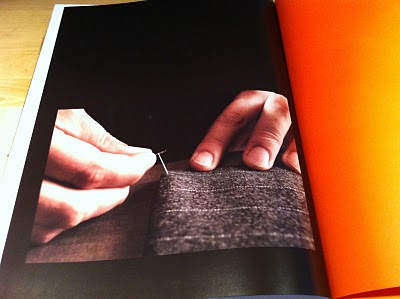

 As mentioned last week, we were lucky enough to visit Old Town in 2009 and recently we got in touch with some questions. The responses from Will (and Marie) at Old Town were as we had hoped: erudite, opinionated and informative.
As mentioned last week, we were lucky enough to visit Old Town in 2009 and recently we got in touch with some questions. The responses from Will (and Marie) at Old Town were as we had hoped: erudite, opinionated and informative.
The full handwritten answers are published above. Here are some of our favourite extracts:
On the last year at Old Town:
'Mainly engaged in producing 50 to 70 items per week. Between January and March we attempted to secure a shop nearer to our customers in London... We had a lovely new shop sign made by Ashley Bishop.'
On British manufacturing:
'I do get a sense that the issue, i.e the perceived advantage (of making products in the UK) has dropped off the radar as no one expects anything to be made here. I don't mean to sound negative but the kudos of being British made seems to have waned. I don't claim to have my finger on the pulse of current thinking so I could be totally wrong.'
'I can't see where it links designers to factories/suppliers... Some years ago there was the International Wool Secretariat and the Cotton Institute which both had libraries of available fabric which was brilliant. Of course Britain can make it but will customers be prepared to pay for it?'
On their highlights of 2010:
'Miss Willey and I had a lovely week in Walberswick. (We) have nearly had an entire year without a television. Met a great hero (I will leave the mystery of this one to the proprietors of Old Town to impart if you get the chance to visit them - BF) who came to the shop. The cat was ill but made a full recovery. After a long, fruitless search for another machinist (we have seven at the moment), Larisa, who speaks little English, turned up at our door and she is fantastic.'
(A big thank you to Marie and Will at Old Town for their willingness and generosity in helping make this postal interview happen.)
 We spent a wonderful winter's morning 40 floors above London today. On our visit we were told that the steel used in the construction of The Shard (as it wishes to be known, no colloquial nicknames needed sadly) is from the north of England.
We spent a wonderful winter's morning 40 floors above London today. On our visit we were told that the steel used in the construction of The Shard (as it wishes to be known, no colloquial nicknames needed sadly) is from the north of England.












